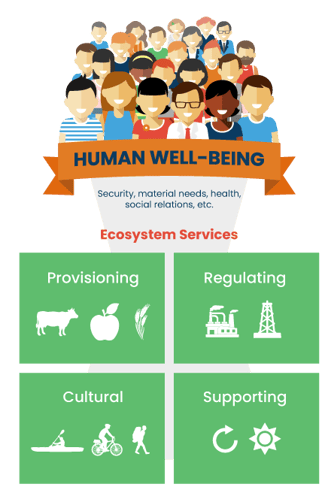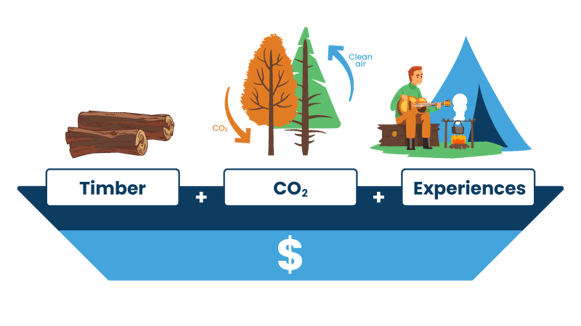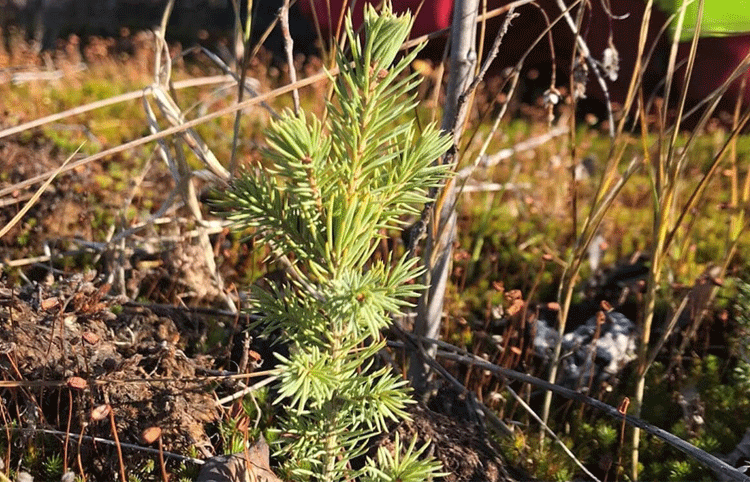Ecosystem services (ES) are the benefits that nature provides to people. This includes everything from food and building materials to spiritual and recreational values.
We normally speak about ecosystem services in terms of four main categories:
- Provisioning services, such as food, freshwater, and raw materials;
- Regulating services, such as air quality and carbon sequestration;
- Cultural services, such as recreation, tourism, and spiritual wellbeing;
- And supporting services, such as habitats and genetic diversity.

Understanding the values that nature provides allows us to better understand how and why we should consider the implications of our actions in natural spaces. Understanding and estimating ecosystem services allow us to translate the benefits nature provides into plain language units. As illustrated below, forests offer far more value than just the value of timber. They offer carbon sequestration (the long-term removal of carbon dioxide from the atmosphere), air quality regulation, as well as lots of recreational and spiritual benefits as well!

Why are Ecosystem Services Important?
People from all areas around the world rely on the services nature provides. We all depend on healthy ecosystems in many ways, including to:
- Purify the air we breathe;
- Sequester carbon for climate regulation;
- Filter nutrients so we have access to clean drinking water without costly infrastructure;
- And pollinate our crops.
As the world’s population continues to grow, so too does our dependence on healthy ecosystems to provide the necessities essential to our well-being.
Want to learn more about why ecosystem services are important to you? Check out our blog!
Indigenous Communities and Cultural Values
For Indigenous communities, human-nature interaction is highly valued. Indigenous Peoples have a long history of sustainable management of the landscape and thus were able to benefit from services provided by nature over millennia.

Recent policy initiatives by federal and provincial governments have shown an increasing uptake in incorporating traditional knowledge into western science for the purposes of industrial activity monitoring and population trends in species at risk estimation. This type of work is critical to truly understand the benefits nature provides.
Ecosystem Services and Climate Change
One of the biggest issues currently facing society is the climate emergency. Climate change affects how ecological systems function and in turn the services they provide that we depend on. For example, changes in soil freezing, snow cover, and air temperature caused by climate change are affecting carbon sequestration. A very important and too often disregarded consideration is how climate change affects Indigenous communities. Indigenous Peoples rely on the services provided by nature and climate change is putting these services at risk.
To learn more about climate changes’ possible impact on ecological systems, visit the ESA journals online library.
Furthermore, over half of global GDP has a high or moderately high dependency on nature. Therefore, losing ecosystem services matters to businesses’ bottom lines. You can learn more about the loss of ecosystem services' effect on the economy by reading the World Economic Forum's 'New Nature Economy Series'.
The climate emergency is daunting, however, there is an opportunity to leverage our understanding of Ecosystem Services to create nature-based solutions that help mitigate against climate change. Nature-based solutions are actions that protect the environment while allowing society to achieve its goals and maintain its values. For example, creating green infrastructure for stormwater management, wetland restoration for water filtration, and afforestation for carbon sequestration all allow society to continue developing while maintaining the environment. Switching to nature-based solutions has the potential to result in 4 trillion dollars in revenue for businesses and over 100 million new jobs by 2030.
Visit the IUCN website to learn more about nature-based solutions.
What Can I Do?
Ecosystem Services are incredibly important to human well-being and climate change is affecting these services and the benefits we derive from nature. To dig deeper into why Ecosystem Services are important and how they are valuable for businesses, check out our blogs: 3 Reasons Why Ecosystem Services are Important to You and Why You Should Be Incorporating Ecosystem Services Into Your Business Plans.
When evaluating projects and business decisions– incorporating Ecosystem Services into your decision package is critical and we can help! Silvacom provides a broad range of service offerings related to ecosystem services that include:
- Ecosystem Service Analysis & Community Engagement
- Conservation planning including environmental markets and offsets
- Forest Carbon Analysis
To learn more about our services in this area visit www.silvacom.com/environment today! Or you can contact us directly by clicking the button below.







